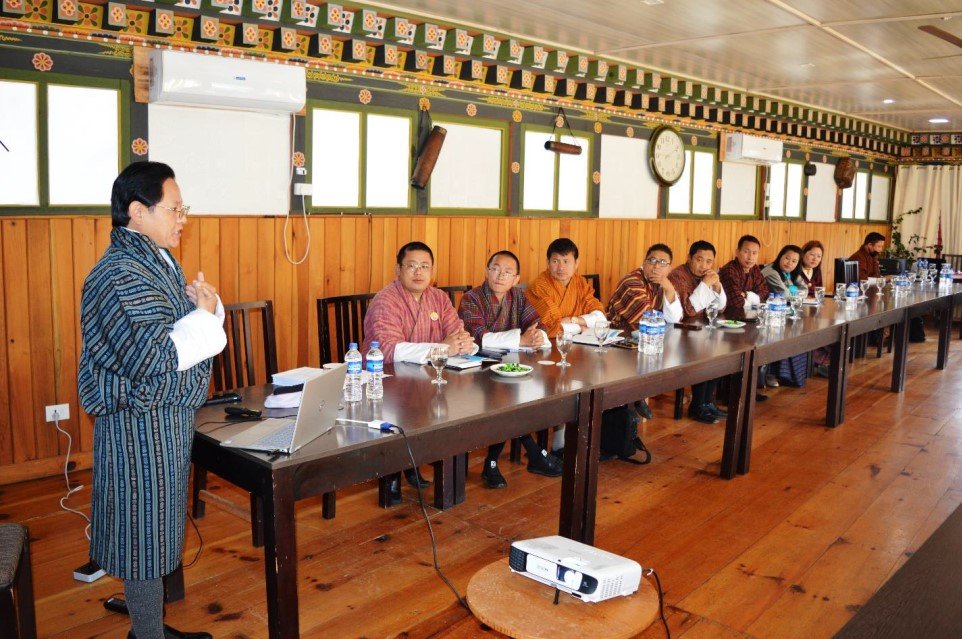|
Bhutan (2021 Deadline)
Health-related quality of life and psychological well-being among people living with HIV in Bhutan
PI: Nidup Dorji (nidupdorji@fnph.edu.bt), Khesar Gyalpo Unviersity of Medical Sciences of Bhutan
U.S. Partner: Kaveh Khoshnood, Yale School of Public Health
Project Dates: April 2022 - June 2023
Project Overview
 | | Dr. Nidup Dorji facilitates a training session for research assistants. Photo courtesy of Dr. Dorji. |
Only an estimated 55.5% of people living with HIV (PLHIV) in Bhutan are diagnosed, one of the lowest diagnosis rates in the world. Government and civil society stakeholders hypothesize that high stigma and poor quality of life impede the ability of Bhutanese PLHIV to move through the HIV cascade of care (CoC). However, little is known about how PLHIV in Bhutan experience stigma and discrimination and how these factors influence quality of life through the CoC. Studies support the benefits of psychosocial interventions to improve quality of life and HIV CoC outcomes, and support and respect gained from family and friends is known to buffer negative psychological states. A key principle of public health intervention design and implementation science is that psychological interventions must be tailored to the needs of the target population, which is least known about PLHIV in Bhutan.
As formal research on HIV in Bhutan is virtually non-existent, this PEER project sought to build a robust research culture focusing specifically on the HIV epidemic in the country. It aimed to inform policymakers, healthcare providers, counselors, family members, relatives, and the general population about the experiences of PLHIV and the influence of these experiences on their QoL and HIV management. Findings from this research will enable policymakers, healthcare providers, and PLHIV to come together to curb the HIV epidemic, promote quality of life, and mitigate the negative consequences associated with HIV. Financial and technical assistance from PEER and the partners from Yale University helped build a robust research culture and generate scientific evidence to create locally tailored interventions to address the determinants of HIV incidence and lack of uptake of care.
Final Summary of Project Activities
The PEER team interviewed 455 people living with HIV, about half male and half female, across multiple study sites throughout Bhutan. The PI Nidup Dorji, co-PI Wangchuk, and their colleagues conducted preliminary data management and analysis. They also trained 45 volunteer counseling and testing focal persons and Health Information Service Center counselors as research assistants (RAs), including training on data management and analysis. Five of the RAs from Thimphu, Phuntsholing, Gelephu, Zhemgang, and Samdrupjongkhar, where the maximum numbers of PLHIV were interviewed, were invited to take part in the final project workshop and were crucial in helping clean the data, checking on double entries and authenticating missing information.
The researchers’ findings included that a majority of PLHIV interviewed were low-income and almost 90% of participants reported adherence to antiretroviral therapy and had their viral load suppressed. More than 80% of participants reported mid-level stigma but 70% reported their quality of life to be good or very good. Participants who reported their general health conditions as good to excellent and perceived themselves to be in better health compared to a year ago reported better quality of life and wellbeing. Those who perceived a mid or high level of stigma and experienced some form of discrimination scored low quality of life and wellbeing. Adverse childhood experiences such as sexual and/or emotional abuse, living with violence in a household, parental separation or divorce, and bullying were significantly related with quality of life and wellbeing. A dose-response relationship also was found between cumulative adverse childhood experiences and quality of life.
In April 2023, Dr. Dorji and Mr. Wangchuk traveled to the Yale School of Public Health to discuss findings, conduct advanced statistical analyses with their U.S. partner Dr. Kaveh Khoshnood and other counterparts, and plan for the dissemination of the findings. Dr. Khoshnood also visited Bhutan in May 2023, conducting a workshop on strengthening research collaborations, identifying funding opportunities, and pursuing networking and innovations. The workshop was attended by the teaching faculty and final year students at the School of Nursing and Public Health of the University of Medical Sciences of Bhutan.
The PEER team disseminated their findings to various healthcare centers in eastern and east central Bhutan. A total of 52 VCT focal persons, including medical doctors and nurses from regional hospitals, attended two dissemination workshops. The Minister of Health of Bhutan and officials of the ministry’s National AIDS Control Program are aware of the study and the team’s findings, which should be useful in informing policies for better care delivery to PLHIV. The study is particularly important, as it was the first ever undertaken directly involving PLHIV since the detection of the first HIV case in Bhutan in the early 1990s.
Back to PEER Bhutan Grant Recipients
|
|
|
|




